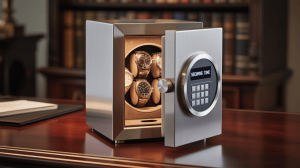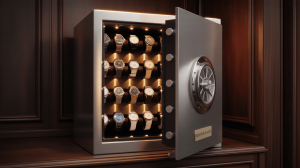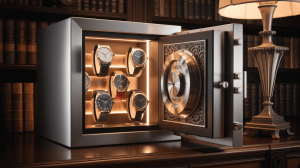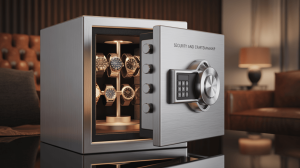Why Every Collector Needs a Safe for Watches. But here’s the kicker… Your watches hold value, history, and craftsmanship that deserve protection beyond a jewelry box. A dedicated safe safeguards them from theft, fire, humidity, and everyday accidents.
1. Protecting Against Theft
Collectors often display timepieces in open trays or drawers, making them easy targets. A watch safe constructed from reinforced steel and thick locking bolts thwarts break‑in attempts. Precision locks—mechanical, electronic, or biometric—ensure only authorized users gain access. Concealed anchor points let you bolt the safe to floors or walls, preventing thieves from simply carrying it away.
| Feature | Description | Benefit |
|---|---|---|
| Reinforced Steel | 12–14 gauge construction | Resists drilling and prying |
| Lock Mechanism | Dial, keypad, or fingerprint | Tailored access control |
| Anchor Points | Floor/furniture mounting | Prevents safe removal |
2. Fire and Heat Protection
Even a small fire can reach temperatures exceeding 1,000 °F within minutes, warping cases and destroying lubricants. A UL 72 Class 350 safe rated for 30–60 minutes at 1,200 °F or above protects delicate movements. Insulation materials like gypsum or ceramic composites block heat transfer, while intumescent gaskets expand to seal out smoke.
3. Guarding Against Moisture and Humidity
Leather straps and metal movements suffer in humid environments. A safe with IP54‑rated seals blocks dust and light moisture. Built‑in desiccant chambers or silica gel packs maintain relative humidity below 50%. Premium safes may include digital hygrometers for real‑time monitoring and active dehumidifier modules for precise environmental control.
4. Preserving Watch Value and Condition
Collectors know that resale value depends on condition. Scratches, tarnish, or moisture damage can instantly reduce a watch’s worth. Interior organization—foam or velvet‑lined cushions and adjustable trays—prevents contact between pieces, maintains polish, and avoids abrasion during retrieval.
| Interior Element | Function | Benefit |
|---|---|---|
| Foam Cushions | Cradles each watch | Prevents scratches |
| Adjustable Trays | Reconfigures slot layout | Accommodates various sizes |
| Hidden Compartments | Stores straps and tools discreetly | Keeps accessories organized |
5. Organization and Easy Access
Well‑designed safes include modular layouts: separate pillow slots, winder bays, and accessory pockets. This keeps watches visible and ready to wear. Time‑delay or biometric locks grant quick access when you need it, while interior LED lighting illuminates each piece without generating heat.
6. Integrating Watch Winders
Automatic watches lose accuracy if left unworn. Built‑in winders keep movements active with customizable turns‑per‑day (TPD) and directional settings. Quiet motors under 25 dB ensure silent operation. Removable winder trays let you switch between winding and static storage based on your rotation schedule.
7. Insurance Benefits and Compliance
Insurers often require certified safes for high‑value collections. Using a UL RSC or ETL‑rated safe can lower premiums and simplify claims in theft or fire events. Compliance with local regulations for valuables storage also provides peace of mind and avoids penalties.
| Insurance Aspect | Requirement | Advantage |
|---|---|---|
| Burglary Rating | UL RSC or equivalent | Lower premiums |
| Fire Rating | UL 72 Class 350+ | Faster claims processing |
| Proof of Installation | Anchoring documentation | Policy compliance |
8. Smart Monitoring and Alerts
Modern safes integrate Bluetooth or Wi‑Fi to send tamper, door‑open, and low‑battery alerts directly to your smartphone. Digital audit logs record every access event. Remote lock/unlock capabilities and real‑time notifications enhance security when you’re away.
9. Balancing Aesthetics with Function
A luxury safe should complement your décor. Sleek matte finishes blend into minimalist spaces, while wood veneers or leather wraps add warmth. Concealed hinges and seamless panels maintain an elegant façade, making the safe a decorative feature rather than an eyesore.
10. Space Efficiency and Placement
Compact safes fit under beds, inside closets, or on shelves. Measure your intended location—account for hinges, clearance, and pillow height—to ensure a snug fit. Proper placement enhances concealment and deters casual tampering.
| Placement Option | Visibility Level | Security Impact |
|---|---|---|
| Under‑Bed Install | Very low | Hidden from view |
| Closet Shelf | Low | Out of casual reach |
| Bookcase Integration | Concealed | Blends with surroundings |
11. Noise and Vibration Considerations
Watch winders and locking bolts can generate noise. Choose models with vibration‑dampened mounts and low‑noise motors under 25 dB. Soft‑close hinges prevent slamming. Review user feedback on quietness to ensure the safe doesn’t disturb bedrooms or offices.
12. Power and Backup Strategies
Electronic and biometric safes need reliable power. Seek dual‑power options: AC adapters for everyday use and rechargeable battery packs for backup. Low‑battery alerts via LED or smartphone prevent unexpected shutdowns. Always keep a hidden manual override key or mechanical dial to guarantee access.
| Power Source | Backup Method | Maintenance |
|---|---|---|
| AC Adapter | N/A | Monthly plug‑in check |
| Rechargeable Pack | Manual override key | Recharge every 6 months |
| Solar Trickler | Hidden override code | Clean panels quarterly |
13. Fire‑Resistant Vaults for High‑Value Pieces
For collections exceeding several dozen watches, consider large fire‑resistant vaults. These offer multi‑hour ratings, reinforced doors, and dual locking systems. While more expensive and heavier, they provide maximum protection for heirloom or investment-grade pieces.
14. Budgeting and Value Analysis
Watch safes range from $100 for basic steel boxes to $2,000+ for premium biometric, winder‑integrated units. Entry‑level models cover basic security; mid‑range add fire and humidity controls; premium safes feature advanced locks, smart connectivity, and luxury finishes. Allocate budget based on must‑have certifications and interior needs before optional extras.
15. Warranty, Service, and Lifespan
A robust warranty—2–5 years on structure and electronics—reflects manufacturer confidence. Onsite service, spare‑part availability, and responsive customer support simplify repairs. Routine maintenance—dusting, lock tests, battery checks, and lining inspection—extends lifespan, ensuring your safe remains reliable for decades.
Conclusion
Every collector deserves a watch safe that merges security with elegance. Ready for the good part? Use this guide to select a certified, feature‑rich safe that protects your collection from theft, fire, and environmental hazards, while showcasing it in refined style.
FAQ
Q1: What burglary rating is best?
Aim for UL RSC or ETL certification for proven forced‑entry resistance.
Q2: How often replace desiccant packs?
Every 6–12 months based on local humidity.
Q3: Are biometric locks reliable?
Yes—premium scanners include encrypted templates and backup devices.
Q4: Do smart features require subscriptions?
Basic app controls are free; advanced monitoring may incur fees.
Q5: Is professional installation necessary?
DIY anchoring suffices—ensure you bolt to studs or concrete per guidelines.







